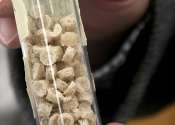Engineered yeast could produce low-cost plastics from renewable resources
(PhysOrg.com) -- With the goal to reduce our dependence on fossil fuels, scientists are looking for alternative methods to produce plastics that are based on renewable oils. In a new study, scientists have developed a method ...









